Fleurs du Mal Magazine


Literaire Salon in’t Wevershuisje het op woensdag 20 Augustus sy tweede aflewering in Tilburg beleef. Die eerste aflewering was op 30 Junie 2013 met die Afrikaanse digteres Heilna du Plooy as hoofgas. Intussen het haar nuutste digbundel, Die stilte opgeskort (2014) by Protea Boekhuis verskyn. Die salon wens haar graag as vorige gas geluk met hierdie mooi ontwikkeling. Op die oomblik lyk dit asof hierdie privaat inisiatief een maal per jaar aangebied sal word.
Vanjaar was die hoofgas die Afrikaanse digter Charl-Pierre Naudé.
Literaire Salon in’t Wevershuisje bly getrou aan sy doel om ’n klein en intieme ontmoetingsruimte te skep ter wille van kontak en inspirasie tussen digters, kortverhaal- of kinderboekskrywers uit drie lande: Suid-Afrika, Nederland en België. Tot dusver is nog net digters uitgenooi – vanjaar ses. Tuis by Carina van der Walt en haar man, Geno Spoormans, word méér as voorlesings uit eie werk verwag. Dit is die waarderende deel. In deel twee van die program word daar van die deelnemers verwag om mekaar se werk te vertaal. Dit is die inspirerende deel. Vertalings sal deur die loop van die volgende jaar op hierdie webwerf gepubliseer word en ook in Ambrozijn – ’n Belgiese literêre blad uit Ieper.
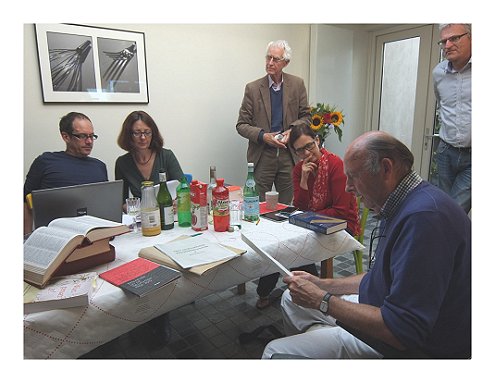
Links Charl-Pierre Naudé en Carina van der Walt. Rechts, zittend, Willy Martin
In kleiner kring is die publikasie van Charl-Pierre Naudé se volgende bundel hier vooruit gevier. Al die lieflike dade (2014) sal in September by uitgewery Tafelberg verskyn. Op die oomblik werk Naudé as as een van die organisasie DAAD se beurshouers in Berlyn. Die Nederlandse gas was K. Michel uit Amsterdam. Albei die digters het gedigte voorgelees wat nog nie in bundels verskyn het nie. Van hierdie gedigte word nou vertaal.
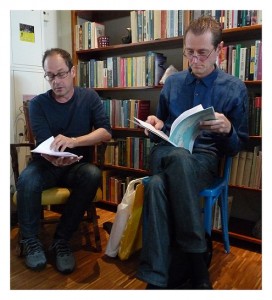
Die derde stadsdigter van Tilburg, Frank van Pamelen, het onderweg terug van sy nuwe uitgewer vinnig ingeval by die Literaire Salon in’t Wevershuisje om ekstra luister daaraan te verleen. Sy ervaring op die podium het na die ander digters toe deurgesyfer en het gesorg vir ’n gemoedelike stemming. Die interessante ooreenkoms tussen Naudé en Van Pamelen is dat albei op die oomblik hulle digterskap uitbrei na ’n ander genre. Naudé werk aan ‘n roman en Van Pamelen se eerste riller sal in die voorjaar van 2015 verskyn.
Digteres Emma Crebolder was vir die tweede agtereenvolgende jaar op besoek by die Literaire Salon in’t Wevershuisje. Nommer drie van haar trilogie Vergeten (2010), Vallen (2012) en nou Verzoening (2014) by uitgewery Nieuw Amsterdam word op 12 September in boekwinkel De Tribune bekend gestel in Maastricht. Uit België was die digter uit Leuven, Willy Martin, ook vir die tweede agtereen voldende jaar op besoek. Nuus vars uit die oond is dat Martin en Van der Walt pas te hore gekry het dat hulle ’n klein, maar bekende uitgewer met ’n goeie reputasie gekry het vir hulle eksperimentele duobundel. Die lang pad wat voorlê is die bevestiging van reeds beloofde borge en redaksionele afronding. Dit demp nie hulle opgewondenheid nie! Webmeester Jef van Kempen uit Tilburg was as waarnemer en as deelnemende digter ook vir ’n tweede maal teenwoordig. Alle vertalings wat voortkom uit Literaire Salon in’t Wevershuisje sal in ’n nuwe stroom publikasies op fleursdumal.nl verskyn.
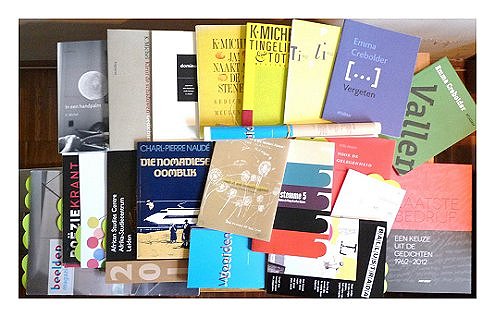
Laaste maar beslis nie die minste nie was die optrede van Cora van Lierop. As violis reis sy die wêreld rond en is pas terug uit Tsjeggië, waar sy die afgelope agt jaar ’n intensiewe tiendag kursus saam met ander simfonie orkeslede uit Europa gevolg het. Van Lierop het die Literaire Salon in’t Wevershuisje geopen met ’n Siciliaanse dans van Vivaldi. Aan die einde van de middag se eerste deel het Van Lierop en Van der Walt saam twee gedigte onder vioolbegeleiding uitgevoer: Wevershuisje saam met Drobnosti van Antonín Dvořák en Welkom saam met Romanza, ook van Antonín Dvořák.
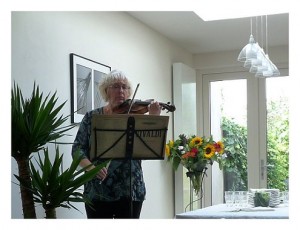
Dvořák was ’n Tsjeggiese komponis wat Amerika toe geëmmigreer het en lieflike miniature vol heimwee en verlange terug na sy vaderland toe gekomponeer het. Dit het die stemming van die salon pragtig saamgevat. Op 31 Augustus speel Van Lierop as simfonie-orkeslid die nuut gekomponeerde stuk Horses, a gift to mankind. Dit is gekomponeer deur Paul van Gülick na aanleiding van War Horse en die herdenking van die eerste wêreldoorlog. Die uitvoering sal in die Laurentius-kerk in Ulvenhout plaasvind.
Die Literaire Salon in’t Wevershuisje sidder van kreatiewe energie. Van der Walt en Spoormans hoop om in die toekoms hierdie salon én sy besonder inspirerende karakter in stand te kan hou.
fleursdumal.nl magazine
More in: Carina van der Walt, Charl-Pierre Naudé, Crebolder, Emma, Frank van Pamelen, Jef van Kempen, Literaire Salon in 't Wevershuisje, TRANSLATION ARCHIVE, VERTAALVRUCHT, Willy Martin
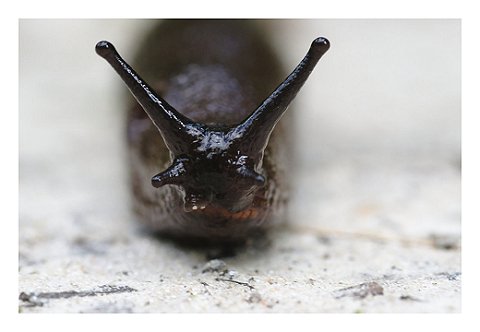
Hans Hermans photos © 2014: Slak
# More on website Hans Hermans
fleursdumal.nl magazine
More in: Dutch Landscapes, Hans Hermans Photos, MUSEUM OF NATURAL HISTORY - department of ravens & crows, birds of prey, riding a zebra, spring, summer, autumn, winter
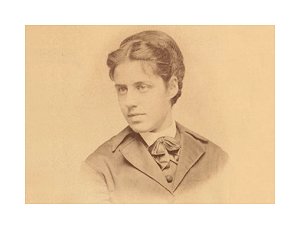
Emma Lazarus
(1849 – 1887)
Sympathy
It comes not in such wise as she had deemed,
Else might she still have clung to her despair.
More tender, grateful than she could have dreamed,
Fond hands passed pitying over brows and hair,
And gentle words borne softly through the air,
Calming her weary sense and wildered mind,
By welcome, dear communion with her kind.
Ah! she forswore all words as empty lies;
What speech could help, encourage, or repair?
Yet when she meets these grave, indulgent eyes,
Fulfilled with pity, simplest words are fair,
Caressing, meaningless, that do not dare
To compensate or mend, but merely soothe
With hopeful visions after bitter Truth.
One who through conquered trouble had grown wise,
To read the grief unspoken, unexpressed,
The misery of the blank and heavy eyes,–
Or through youth’s infinite compassion guessed
The heavy burden,–such a one brought rest,
And bade her lay aside her doubts and fears,
While the hard pain dissolved in blessed tears.
Emma Lazarus poetry
fleursdumal.nl magazine
More in: Archive K-L, Lazarus, Emma
Bert
Bevers
Ik moest nog leren schrijven
Vingers in aangeslagen adem dansend op koeren
van nabije duiven. Eerder op verweerde ruiten tekens
dan op papier. Wat wist ik wat ik niet mocht weten?
Dakkapel vol glanzende ogen. Verlangen pal
als een bloeiende klaproos. Andere tijd.
Uit de muffe plunjezak die geduldig op herhaling
wacht plukt mijn kleine lichaam de bekende
helm: het speelt soldaat geruisloos om verwante slaap
niet te verstoren. Herinner me van voorspelbaarheid
cadans maar niet meer wat het ventje dat aan mij begon
toen dacht. O, zondag: vang toch snel uw trage feesten aan.
Bert Bevers
Eerder verschenen in In de buurt van de wereld, Kleinood & Grootzeer, Bergen op Zoom, 2002
fleursdumal.nl magazine
More in: Archive A-B, Bevers, Bert

The Sorrows of Young Werther (54) by J.W. von Goethe
DECEMBER 6.
How her image haunts me! Waking or asleep, she fills my entire soul!
Soon as I close my eyes, here, in my brain, where all the nerves of
vision are concentrated, her dark eyes are imprinted. Here–I do not
know how to describe it; but, if I shut my eyes, hers are immediately
before me: dark as an abyss they open upon me, and absorb my senses.
And what is man–that boasted demigod? Do not his powers fail when he
most requires their use? And whether he soar in joy, or sink in sorrow,
is not his career in both inevitably arrested? And, whilst he fondly
dreams that he is grasping at infinity, does he not feel compelled to
return to a consciousness of his cold, monotonous existence?
THE EDITOR TO THE READER.
It is a matter of extreme regret that we want original evidence of the
last remarkable days of our friend; and we are, therefore, obliged
to interrupt the progress of his correspondence, and to supply the
deficiency by a connected narration.
I have felt it my duty to collect accurate information from the mouths
of persons well acquainted with his history. The story is simple; and
all the accounts agree, except in some unimportant particulars. It is
true, that, with respect to the characters of the persons spoken of,
opinions and judgments vary.
We have only, then, to relate conscientiously the facts which our
diligent labour has enabled us to collect, to give the letters of the
deceased, and to pay particular attention to the slightest fragment from
his pen, more especially as it is so difficult to discover the real and
correct motives of men who are not of the common order.
Sorrow and discontent had taken deep root in Werther’s soul, and
gradually imparted their character to his whole being. The harmony of
his mind became completely disturbed; a perpetual excitement and mental
irritation, which weakened his natural powers, produced the saddest
effects upon him, and rendered him at length the victim of an exhaustion
against which he struggled with still more painful efforts than he had
displayed, even in contending with his other misfortunes. His mental
anxiety weakened his various good qualities; and he was soon converted
into a gloomy companion, always unhappy and unjust in his ideas, the
more wretched he became. This was, at least, the opinion of Albert’s
friends. They assert, moreover, that the character of Albert himself had
undergone no change in the meantime: he was still the same being whom
Werther had loved, honoured, and respected from the commencement. His
love for Charlotte was unbounded: he was proud of her, and desired that
she should be recognised by every one as the noblest of created beings.
Was he, however, to blame for wishing to avert from her every appearance
of suspicion? or for his unwillingness to share his rich prize with
another, even for a moment, and in the most innocent manner? It is
asserted that Albert frequently retired from his wife’s apartment during
Werther’s visits; but this did not arise from hatred or aversion to
his friend, but only from a feeling that his presence was oppressive to
Werther.
Charlotte’s father, who was confined to the house by indisposition, was
accustomed to send his carriage for her, that she might make excursions
in the neighbourhood. One day the weather had been unusually severe, and
the whole country was covered with snow.
Werther went for Charlotte the following morning, in order that, if
Albert were absent, he might conduct her home.
The beautiful weather produced but little impression on his troubled
spirit. A heavy weight lay upon his soul, deep melancholy had taken
possession of him, and his mind knew no change save from one painful
thought to another.
As he now never enjoyed internal peace, the condition of his fellow
creatures was to him a perpetual source of trouble and distress. He
believed he had disturbed the happiness of Albert and his wife; and,
whilst he censured himself strongly for this, he began to entertain a
secret dislike to Albert.
His thoughts were occasionally directed to this point. “Yes,” he would
repeat to himself, with ill-concealed dissatisfaction, “yes, this is,
after all, the extent of that confiding, dear, tender, and sympathetic
love, that calm and eternal fidelity! What do I behold but satiety and
indifference? Does not every frivolous engagement attract him more than
his charming and lovely wife? Does he know how to prize his happiness?
Can he value her as she deserves? He possesses her, it is true, I know
that, as I know much more, and I have become accustomed to the thought
that he will drive me mad, or, perhaps, murder me. Is his friendship
toward me unimpaired? Does he not view my attachment to Charlotte as
an infringement upon his rights, and consider my attention to her as a
silent rebuke to himself? I know, and indeed feel, that he dislikes me,
that he wishes for my absence, that my presence is hateful to him.”
He would often pause when on his way to visit Charlotte, stand still, as
though in doubt, and seem desirous of returning, but would nevertheless
proceed; and, engaged in such thoughts and soliloquies as we have
described, he finally reached the hunting-lodge, with a sort of
involuntary consent.
Upon one occasion he entered the house; and, inquiring for Charlotte,
he observed that the inmates were in a state of unusual confusion.
The eldest boy informed him that a dreadful misfortune had occurred
at Walheim,–that a peasant had been murdered! But this made little
impression upon him. Entering the apartment, he found Charlotte engaged
reasoning with her father, who, in spite of his infirmity, insisted on
going to the scene of the crime, in order to institute an inquiry. The
criminal was unknown; the victim had been found dead at his own door
that morning. Suspicions were excited: the murdered man had been in
the service of a widow, and the person who had previously filled the
situation had been dismissed from her employment.
As soon as Werther heard this, he exclaimed with great excitement,
“Is it possible! I must go to the spot–I cannot delay a moment!” He
hastened to Walheim. Every incident returned vividly to his remembrance;
and he entertained not the slightest doubt that that man was the
murderer to whom he had so often spoken, and for whom he entertained
so much regard. His way took him past the well-known lime trees, to the
house where the body had been carried; and his feelings were greatly
excited at the sight of the fondly recollected spot. That threshold
where the neighbours’ children had so often played together was stained
with blood; love and attachment, the noblest feelings of human nature,
had been converted into violence and murder. The huge trees stood there
leafless and covered with hoarfrost; the beautiful hedgerows which
surrounded the old churchyard wall were withered; and the gravestones,
half covered with snow, were visible through the openings.
As he approached the inn, in front of which the whole village was
assembled, screams were suddenly heard. A troop of armed peasants was
seen approaching, and every one exclaimed that the criminal had been
apprehended. Werther looked, and was not long in doubt. The prisoner
was no other than the servant, who had been formerly so attached to the
widow, and whom he had met prowling about, with that suppressed anger
and ill-concealed despair, which we have before described.
“What have you done, unfortunate man?” inquired Werther, as he advanced
toward the prisoner. The latter turned his eyes upon him in silence, and
then replied with perfect composure; “No one will now marry her, and
she will marry no one.” The prisoner was taken into the inn, and Werther
left the place. The mind of Werther was fearfully excited by this
shocking occurrence. He ceased, however, to be oppressed by his usual
feeling of melancholy, moroseness, and indifference to everything
that passed around him. He entertained a strong degree of pity for the
prisoner, and was seized with an indescribable anxiety to save him from
his impending fate. He considered him so unfortunate, he deemed his
crime so excusable, and thought his own condition so nearly similar,
that he felt convinced he could make every one else view the matter in
the light in which he saw it himself. He now became anxious to undertake
his defence, and commenced composing an eloquent speech for the
occasion; and, on his way to the hunting-lodge, he could not refrain
from speaking aloud the statement which he resolved to make to the
judge.
Upon his arrival, he found Albert had been before him: and he was a
little perplexed by this meeting; but he soon recovered himself, and
expressed his opinion with much warmth to the judge. The latter shook,
his head doubtingly; and although Werther urged his case with the utmost
zeal, feeling, and determination in defence of his client, yet, as we
may easily suppose, the judge was not much influenced by his appeal.
On the contrary, he interrupted him in his address, reasoned with
him seriously, and even administered a rebuke to him for becoming
the advocate of a murderer. He demonstrated, that, according to this
precedent, every law might be violated, and the public security utterly
destroyed. He added, moreover, that in such a case he could himself do
nothing, without incurring the greatest responsibility; that everything
must follow in the usual course, and pursue the ordinary channel.
Werther, however, did not abandon his enterprise, and even besought the
judge to connive at the flight of the prisoner. But this proposal
was peremptorily rejected. Albert, who had taken some part in the
discussion, coincided in opinion with the judge. At this Werther became
enraged, and took his leave in great anger, after the judge had more
than once assured him that the prisoner could not be saved.
The excess of his grief at this assurance may be inferred from a note we
have found amongst his papers, and which was doubtless written upon this
very occasion.
“You cannot be saved, unfortunate man! I see clearly that we cannot be
saved!”
Werther was highly incensed at the observations which Albert had made
to the judge in this matter of the prisoner. He thought he could detect
therein a little bitterness toward himself personally; and although,
upon reflection, it could not escape his sound judgment that their view
of the matter was correct, he felt the greatest possible reluctance to
make such an admission.
A memorandum of Werther’s upon this point, expressive of his general
feelings toward Albert, has been found amongst his papers.
“What is the use of my continually repeating that he is a good and
estimable man? He is an inward torment to me, and I am incapable of
being just toward him.”
One fine evening in winter, when the weather seemed inclined to thaw,
Charlotte and Albert were returning home together. The former looked
from time to time about her, as if she missed Werther’s company. Albert
began to speak of him, and censured him for his prejudices. He
alluded to his unfortunate attachment, and wished it were possible
to discontinue his acquaintance. “I desire it on our own account,” he
added; “and I request you will compel him to alter his deportment toward
you, and to visit you less frequently. The world is censorious, and I
know that here and there we are spoken of.” Charlotte made no reply,
and Albert seemed to feel her silence. At least, from that time he never
again spoke of Werther; and, when she introduced the subject, he allowed
the conversation to die away, or else he directed the discourse into
another channel.
The vain attempt Werther had made to save the unhappy murderer was the
last feeble glimmering of a flame about to be extinguished. He sank
almost immediately afterward into a state of gloom and inactivity, until
he was at length brought to perfect distraction by learning that he
was to be summoned as a witness against the prisoner, who asserted his
complete innocence.
His mind now became oppressed by the recollection of every misfortune
of his past life. The mortification he had suffered at the ambassador’s,
and his subsequent troubles, were revived in his memory. He became
utterly inactive. Destitute of energy, he was cut off from every pursuit
and occupation which compose the business of common life; and he became
a victim to his own susceptibility, and to his restless passion for the
most amiable and beloved of women, whose peace he destroyed. In this
unvarying monotony of existence his days were consumed; and his powers
became exhausted without aim or design, until they brought him to a
sorrowful end.
A few letters which he left behind, and which we here subjoin, afford
the best proofs of his anxiety of mind and of the depth of his passion,
as well as of his doubts and struggles, and of his weariness of life.
The Sorrows of Young Werther (Die Leiden des jungen Werther) by J.W. von Goethe. Translated by R.D. Boylan.
To be continued
fleursdumal.nl magazine
More in: -Die Leiden des jungen Werther, Goethe, Johann Wolfgang von
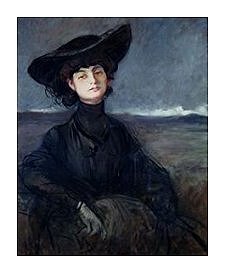
Anna de Noailles
(1876-1933)
Les rêves
Le visage de ceux qu’on n’aime pas encor
Apparaît quelquefois aux fenêtres des rêves,
Et va s’illuminant sur de pâles décors
Dans un argentement de lune qui se lève.
Il flotte du divin aux grâces de leur corps,
Leur regard est intense et leur bouche attentive ;
Il semble qu’ils aient vu les jardins de la mort
Et que plus rien en eux de réel ne survive.
La furtive douceur de leur avènement
Enjôle nos désirs à leurs vouloirs propices,
Nous pressentons en eux d’impérieux amants
Venus pour nous afin que le sort s’accomplisse ;
Ils ont des gestes lents, doux et silencieux,
Notre vie uniment vers leur attente afflue :
Il semble que les corps s’unissent par les yeux
Et que les âmes sont des pages qu’on a lues.
Le mystère s’exalte aux sourdines des voix,
A l’énigme des yeux, au trouble du sourire,
A la grande pitié qui nous vient quelquefois
De leur regard, qui s’imprécise et se retire…
Ce sont des frôlements dont on ne peut guérir,
Où l’on se sent le coeur trop las pour se défendre,
Où l’âme est triste ainsi qu’au moment de mourir ;
Ce sont des unions lamentables et tendres…
Et ceux-là resteront, quand le rêve aura fui,
Mystérieusement les élus du mensonge,
Ceux à qui nous aurons, dans le secret des nuits,
Offert nos lèvres d’ombre, ouvert nos bras de songe.
Anna de Noailles poetry
fleursdumal.nl magazine
More in: Archive M-N, Noailles, Anna de
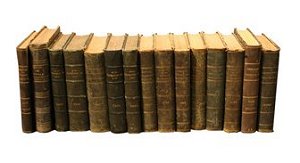
17e editie
Boeken
Rond
Het
Paleis
In het centrum van Tilburg
op zondag 31 augustus 2014
Op zondag 31 augustus a.s. wordt in Tilburg voor de zeventiende maal de boekenmarkt ‘Boeken rond het Paleis’ gehouden. Van 10.00 tot 17.00 uur kunnen de bezoekers weer hun slag slaan bij hun rondgang langs de meer dan 250 kramen. Leesvoer, te kust en te keur.
fleursdumal.nl magazine
More in: - Book Lovers, Art & Literature News
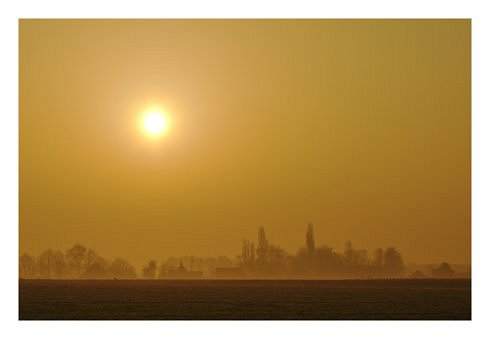
Hans Hermans photos © 2014: Ochtendnevel
# More on website Hans Hermans
fleursdumal.nl magazine
More in: Dutch Landscapes, Hans Hermans Photos, MUSEUM OF NATURAL HISTORY - department of ravens & crows, birds of prey, riding a zebra, spring, summer, autumn, winter
Bert
Bevers
Alleen op Sulawesi
Bijna iedereen zegt ‘Hè, bah!’
wanneer jij je gezicht vertoont.
Het zijn die natte wroetneus
en die rare kromme tanden
die bevreemden, babiroessa.
Ik aai je graag, je komt er echt
voor liggen. Je slimme ogen
zeggen dat je blij bent dat ik
daar naar kijk. Alleen op Sulawesi
kom jij voor. Je lust graag appels.
In een vloek en een zucht zijn
die vermalen. Je staart lijkt op die
van een olifant, wist je dat? Scharrel
rustig voort, zachtmoedig zwijn. Ruik
fijn verder naar vers fruit en regen.
Bert Bevers
Eerder verschenen in Onaangepaste tijden, Zinderend, Bergen op Zoom, 2006
fleursdumal.nl magazine
More in: Archive A-B, Bevers, Bert
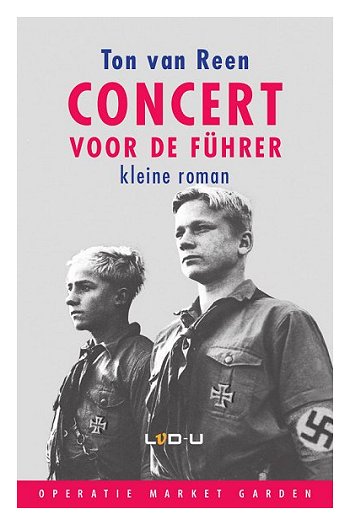
CONCERT VOOR DE FÜHRER van TON VAN REEN verscheen eerder bij Uitgeverij De Geus. Deze derde druk wordt gepubliceerd door Uitgeverij Léon van Dorp. Het boek verschijnt opnieuw vanwege de herdenking in september van Operatie Market Garden, een geallieerd offensief in september 1944 om Nederland te bevrijden. Het was deels een mislukking omdat de laatste brug een brug te ver bleek en het westen van Nederland te maken kreeg met de hongerwinter.
Vlak voordat de geallieerden in september 1944 Operatie Market Garden inzetten, wordt de jonge Duitse soldaat Hermann tijdens een verkenningspatrouille alleen op onderzoek uitgestuurd. Hij bevindt zich, in de buurt van Grave, op bekend terrein. Zijn Nederlandse moeder komt er vandaan en hij is er vaak op vakantie geweest bij zijn grootouders.
De onverwachte geallieerde aanval brengt Hermann letterlijk tussen twee vuren: dat van de vijand die niet zijn persoonlijke vijand is en dat van het Duitse leger dat hem, als gedwongen lid van de Hitlerjugend, tegen zijn wil in het leger heeft ingelijfd.
Hermann vlucht een kerk binnen. Het orgel in de gewijde ruimte doet hem de oorlog even vergeten. Als hij het instrument aanraakt weet hij het: dit is het orgel waarop hij zijn leven lang al wilde spelen. Hij neemt plaats achter het orgel en speelt. Het wordt een concert voor zichzelf en voor zijn vriend en medesoldaat Manfred Reifsche, het wonderkind op de piano. Herinneringen aan zijn jeugd vermengen zich met gedachten aan Manfred, die als deserteur omgekomen is door het vuurpeloton.
Terwijl buiten de oorlog in alle hevigheid woedt, levert Hermann een innerlijke strijd met een gebeurtenis die zijn jonge leven zo zwaar heeft getekend dat hij niet meer aan het noodlot kan ontkomen.
Het verhaal is gebaseerd op een ware gebeurtenis in het kleine dorp Velp bij Grave.
CONCERT VOOR DE FÜHRER van TON VAN REEN verschijnt deze maand bij Uitgeverij Leon van Dorp. Uitgeverij Leon van Dorp is een jonge uitgeverij die zich specialiseert in literatuur, wetenschap en regionale geschiedenis.
fleursdumal.nl magazine
More in: - Book News, Art & Literature News, Reen, Ton van, Ton van Reen

The Sorrows of Young Werther (53) by J.W. von Goethe
DECEMBER 1.
Wilhelm, the man about whom I wrote to you--that man so enviable in his
misfortunes--was secretary to Charlotte's father; and an unhappy passion
for her which he cherished, concealed, and at length discovered, caused
him to be dismissed from his situation. This made him mad. Think, whilst
you peruse this plain narration, what an impression the circumstance has
made upon me! But it was related to me by Albert with as much calmness
as you will probably peruse it.
DECEMBER 4.
I implore your attention. It is all over with me. I can support this
state no longer. To-day I was sitting by Charlotte. She was playing
upon her piano a succession of delightful melodies, with such intense
expression! Her little sister was dressing her doll upon my lap. The
tears came into my eyes. I leaned down, and looked intently at her
wedding-ring: my tears fell--immediately she began to play that
favourite, that divine, air which has so often enchanted me. I felt
comfort from a recollection of the past, of those bygone days when that
air was familiar to me; and then I recalled all the sorrows and the
disappointments which I had since endured. I paced with hasty strides
through the room, my heart became convulsed with painful emotions. At
length I went up to her, and exclaimed With eagerness, "For Heaven's
sake, play that air no longer!" She stopped, and looked steadfastly at
me. She then said, with a smile which sunk deep into my heart, "Werther,
you are ill: your dearest food is distasteful to you. But go, I entreat
you, and endeavour to compose yourself." I tore myself away. God, thou
seest my torments, and wilt end them!
The Sorrows of Young Werther (Die Leiden des jungen Werther) by J.W. von Goethe. Translated by R.D. Boylan.
To be continued
fleursdumal.nl magazine
More in: -Die Leiden des jungen Werther, Goethe, Johann Wolfgang von

Op zondag 31 augustus houdt het Consortium Musicum Divertimento een concert in de Laurentiuskerk in Ulvenhout:
Laurentiuskerk
Dorpsstraat 43 – Ulvenhout
Zondag 31 augustus 2014 – 15.00 uur
Programma
Felix Mendelssohn “Denn er hat seinen Engeln befohlen”
Trompetconcert van Alexander Arutunian
Felix Mendelssohn, Psalmen opus 42
Paul van Gulick, “Horses: A gift to mankind
Paul van Gulick, “Sea of Sunset: 1. By the sea 2. Love and friendship 3. To the moon”
# Meer informatie Facebook Consortium Musicum Divertimento
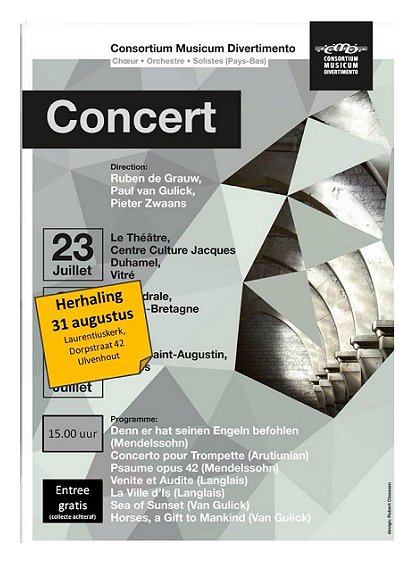
fleursdumal.nl magazine
More in: Art & Literature News, MUSIC
Thank you for reading Fleurs du Mal - magazine for art & literature